

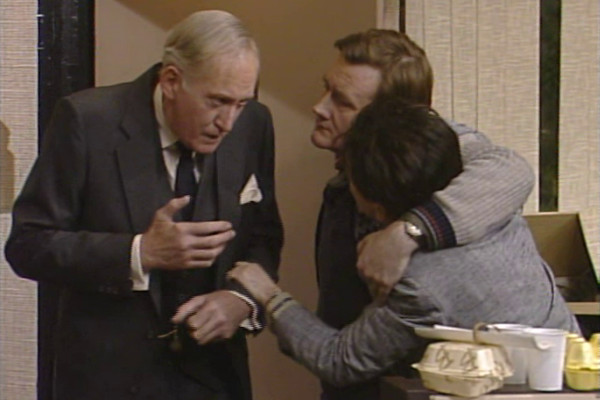
For a lot of this site's audience, then I imagine Kit Curran was a childhood/early adolescence experience. On a personal note, I certainly regarded Kit as something of an engaging maverick, almost up there with anarchic, untamed characters like Tom Baker's Doctor or the title character from Monkey. Sadly, while amusing to a child, to most reasonable adults then Kit – an egomaniacal, self-absorbed local radio DJ – is deeply irritating. Having since worked in local radio, Kit's "big fish in a small pond" attitude is something I've experienced first-hand, and it's not all that pleasant to be around. Of course, Kit not actually being a wild, rebellious youth but a delusional man nearly pushing forty is the joke, but it's one that's hard to get behind with hindsight.
There are some nice enough lines in this first episode – "that's not a snack, it's a suicide attempt" – but many of the punchlines can be seen coming a mile off. What was once a fairly biting attack on the media (for the time) now seems pure MOR ITV sitcom fodder. Clive Merrison, while always good value, is lowered to pulling a few "funny faces" or pretending to have a speech impediment to get a laugh from the easily-pleased studio audience, and the entire plot of this first episode revolves around Kit and his two colleagues trying to undermine their new boss.
Realising that he'll run the radio station with a firmer hand, they discover that he'd had a nervous breakdown in his past and attempt to push him into a second. While it may have been amusing at the time, in 2016 where there's a more sympathetic attitude towards mental health, it does come over as somewhat crass. Thankfully the boss in question (Brian Wilde) manages to get the upper hand, and stays for the remainder of the season.
Perhaps the most appealing comedy writer involved in the show is Ian La Frenais, who provided the lyrics to the theme song, which, in its "80s New Wave sung by Lawson" way, is still quite catchy. It was released as a single that year, though only reached No.99 in the charts, and the Channel 4 series, while still featuring it in the opening credits (with modified lyrics), replaced it with an unappealing instrumental version for the end theme.
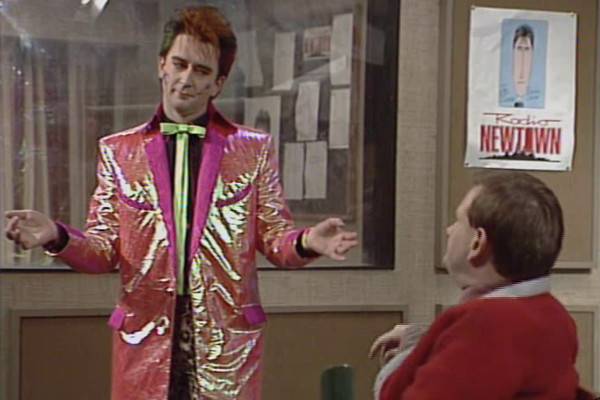
Although there's nothing spectacular about the production on Kit Curran, it's reasonably well done, performed in front of a live studio audience. However, look out for a boom mike in shot on the first scene here, a rare example of the technical side intruding on this multi-camera set up. The second season, with its glass door office, would be more notable in this field, the studio lights often being reflected in surfaces.
As for this episode, then the clashes between Kit and his boss reach a head. Throughout the first season Kit pulls various scams to better himself and keep his job, while his boss Roland Simpson (Brian Wilde) alternately tries to get rid of him/naively trusts him in some new scheme. Brian Wilde is always a great performer, and this is the third "Worst To Best" article to include a series featuring him (after Ace Of Wands and The Sweeney) and probably won't be the last. However, the character he's called upon to play here is a two-dimensional sitcom goof, with the wool constantly pulled over his eyes by Kit's deceptions, in behaviour so outlandish that no human alive would fall for it.
The excuse "it's just supposed to be a laugh" is ready-made for such situations, but it's this adherence to unrealistic farce and paper thin characterisations that has given ITV such a bad reputation for sitcoms. Although the oft-repeated adage "the only classic sitcom ITV ever made was Rising Damp" is quite a bit of an exaggeration, it comes from a very real place, where for every decentish sitcom like Man About The House or Shelley, there's a dozen Barbaras or Brighton Belles.
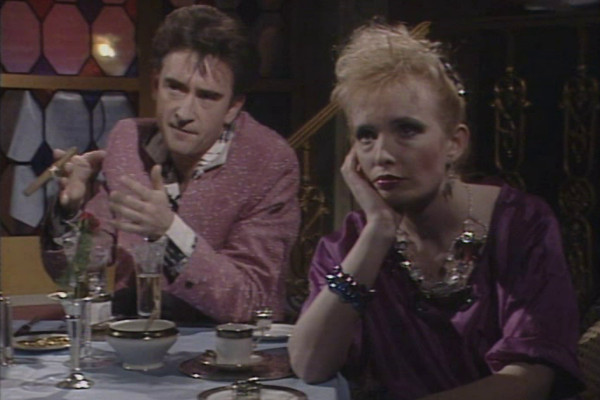
Although there's not a massive difference when the series moved to Channel 4 – it was still being made by Thames Television – it does seem a little ruder in places. The closest to the line that the ITV series got was probably Kit's line of "I feel as nervous as an elephant's gynaecologist." The second season Damien becomes even swearier and angrier, dropping the funny faces in favour of telling Kit that someone's "taking the piss", or slating him as "testicle head", "bollock brain" and "scrotum features". Even Pamela will flag up Kit's "bullshit".
Channel 4 was still a new channel when they aired this series, its launch less than four years earlier. Although it doesn't share the longevity of ITV, and consequently has less sitcoms to choose from, its hit ratio with the medium is generally regarded as far higher than ITV's, where its niche audience means it doesn't have the same need for broader comedies to satisfy a wider demographic. Although it still has its fair share of weak sitcoms, efforts like Black Books, The Inbetweeners, Peep Show and Toast of London raise a smile here at the Anorak Zone, and there are many more. Contemporaries of Kit Curran included Chance In A Million, which was also produced by Thames and aired on Channel 4.
Kit, already a barely likeable character and not really a role model, now flips over into full on "pratt" mode, wearing pastel suits, making sexist overtures to a female worker in the same building (Lindsay Duncan) and extoling the virtues of Thatcherism without irony. Although the use of Kit's adulation for the Conservative Prime Minister of the age is there to satirically undermine her, it's hard to think of another sitcom that painted its lead character as such a repellent individual, the supporting characters there to act as the authorial voice. Even the legendary Alf Garnett was shown to be something of a blowhard, capable of moments of charm. While two of the most popular characters of the era were "entrepreneurs" in Del Trotter and Arthur Daley, Kit is shown in season two to be so mercenary that he'd even deliberately start a riot to make money. Although it's just a "comedy" and perhaps shouldn't be analysed so closely, it does make him an unlikeable and unlikely character for a sitcom lead.
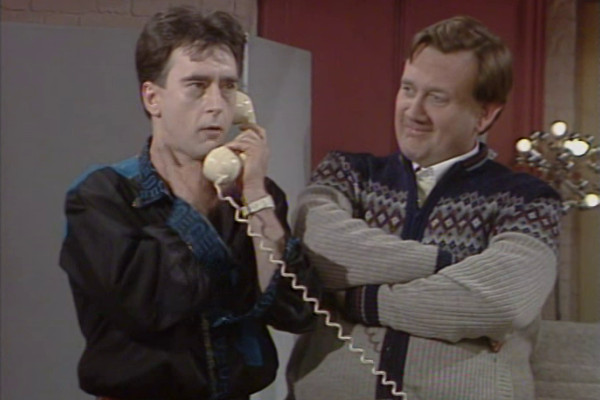
One of the better season two episodes, where the script seems a little sharper than usual. Kit sets up a dating agency, and, while his plan to make Pamela fall for him by pretending he's terminally ill is extremely unethical, there's a pace and energy to the episode that keeps it moving. Damien's bitterness towards women also comes to the fore with one of the series' best lines: "one of those women who keeps tom cats, just for the pleasure of taking them to the vet."
One other notable element of the programme is that the cast seem to enjoy appearing in it. While they regularly stop talking or repeat sentences to get around the audience laughter, there's also signs that they enjoy each others' performances. It's rarely overt, sometimes just an almost indistinguishable spasm near the mouth, or the odd twinkle in the eyes while a co-performer is delivering a line. But this episode gives the finest example of it, as Denis Lawson imitates two people on a "crossed line" to get rid of an unwanted caller, and Paul Brooke can clearly be seen smiling and suppressing a laugh. The internet has virtually zero Kit Curran content, and the cast don't appear to have conducted any archived interviews regarding it, but it's nice to have a clear sign they had such fun while making it.
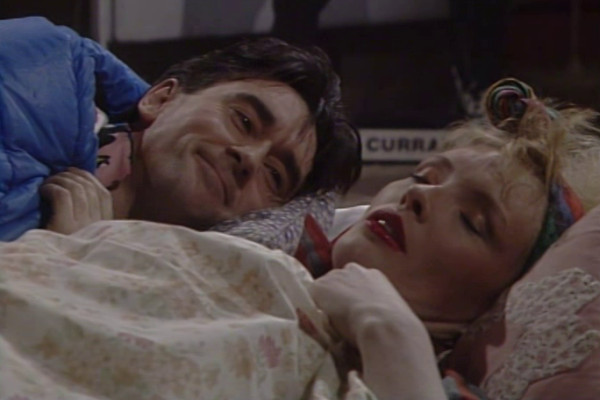
There's an odd disconnect with the humour at times in Kit Curran. In many ways it's trapped between the two stools of mainstream comedy and something more edgy, more satirical. The Lucky Break begins with an ambulance rushing to a scene of a potentially fatal heart attack, only to be disrupted by Kit using the emergency wavelength, and this episode, coming off the back of two London riots in 1985, gives us a city driven to violent otubreaks. Fine in a darker, more biting sitcom, but in a set up that exists in an unreal world of playing to the gallery and unbelievable situations, it's a jarring fit. It's as if the series wants to evolve into a more edgy, meaningful Channel 4 sitcom but, still produced by Thames, hasn't quite thrown off the mainstream ITV shackles.
Channel 4 was still a very different broadcaster at the time, of course. A channel that wasn't afraid to give more experimental fare a go, from melancholy, almost forgotten cartoons like Murun Buchstansangur, or short films composed almost entirely of stills or minimalist shots, like John Smith's striking The Black Tower. The plot of this episode is basically an excuse to force Pamela to be trapped in the building with Kit, his schoolboyish desire for her and childish attempts to woe her seeming very old hat, possibly even at the time of airing.
Lindsay Duncan does well in a nothing role, and, in fairness, none of the characters are in any way fleshed out or believable, only the considerable skills of the actors involved adding more to them than what's on the page. However, less than ten years later Channel 4 was broadcasting series with far more progressive roles for women, such as Dressing for Breakfast, making this second season seem something of a relic. Despite such severe criticisms, this still manages to be one of the episodes that stands up better than some others in modern terms, hence its high placing here.
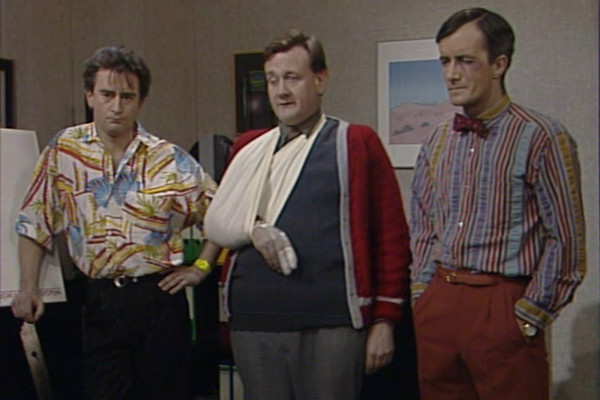
Kit Curran creator Andy Hamilton's most famous work is probably Drop The Dead Donkey, the topical newsroom sitcom he wrote and created with Guy Jenkin. Although The Kit Curran Radio Show is by no means a topical social satire, there are glimpses throughout the series of light political references that would inform his later work.
What places the series in a very different time here is Kit citing Lebanon as an example of a country with a volatile landscape. Yet most prominent is Damien's fear of a then-possible nuclear Armageddon, or Kit involved with disgruntled residents of an underprivileged area. When the series was shown, unemployment had reached over three million, or nearly 12% of the populace. Although the "disgruntled residents" don't look like they're rocking Kit's car particularly fiercely, it's a nice way for the series to be topical and engage with the times in which it was made, making this probably the best episode.
Sadly, the second half sees Kit attempt to make the station a more populist one, which entails him organising talent contests in the studio, and other elements of broad, cheap humour, culminating in the boss fainting in shock. So, it has to be asked: does Kit Curran stand up, three decades later? Well, all comedy is subjective, and this is just one site's guide... if you're reading this, then you might disagree and actually love the show. And, certainly, it's not awful. It's easy to say that it smacks of missed opportunities and could have been something more cutting, more relevant. But ultimately, while I wish I'd personally left this show in the past as a pleasant memory, it goes under the heading of "it was funny at the time", and, really, that's maybe all any comedy series can ask.